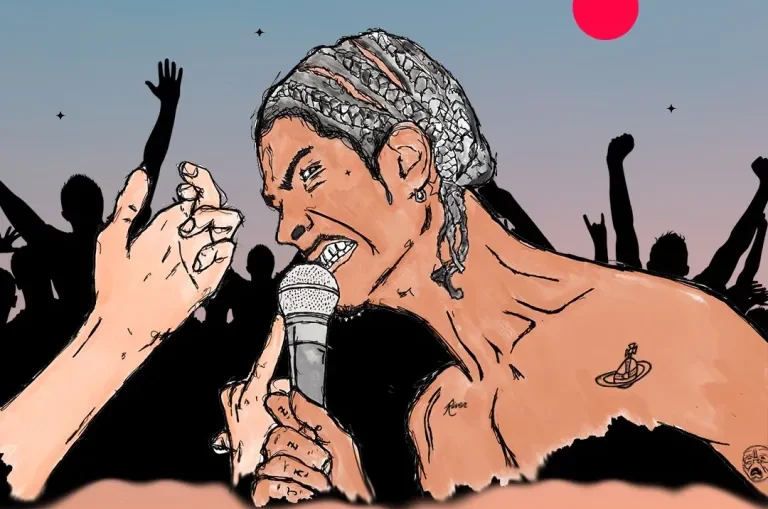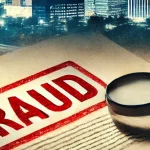In a city where the arts are often hailed as a space for creativity, inclusivity, and progress, the events that transpired at the Stardust Music Festival in Baltimore in September 2021 painted a different picture altogether. This music festival, organized in celebration of Butch Dawson’s album release, became a symbol of the disturbing issues plaguing the Baltimore arts community. Far from a celebration of artistic achievement, the event was marred by violence, suppression of voices, and the perpetuation of an ongoing culture of silence surrounding sexual abuse.
This wasn’t just another protest against an artist or a fleeting moment of political discontent. This was a full-scale public reckoning with a man who has allegedly abused at least 20 women within the local arts community: Karlos Locke. Locke, a former manager for Butch Dawson and other Basement Rap artists, stands accused of being a sexual predator, using his position of power and influence to exploit women within the scene. The protests, however, weren’t just about his abuse. They were also about the lack of accountability, the disregard for the victims’ voices, and the complicity of the artists who chose to remain silent in the face of the allegations.
The Protest at the Stardust Music Festival
The Stardust Music Festival, held at the YNot Lot during Labor Day weekend, was supposed to be a celebration of art and music. But what was meant to be a night of revelry quickly turned into a battleground between protesters and attendees. Videos of the protest spread rapidly on social media, with the hashtag #1Man20Victims gaining traction. Protesters, many of whom were women, stood in front of the stage, holding a simple sign reading “1 Man + 20 Victims.” The sign was an unambiguous call for justice. But instead of the artists and organizers of the festival standing in solidarity with the protesters, they chose to side with the man accused of horrific crimes.
What followed was nothing short of a disgrace. Performers at the festival can be seen in videos aggressively confronting the peaceful protesters. One of the most disturbing moments captured was Butch Dawson himself on stage, urging violence against the protesters. His words, “I ain’t got nothing to do with no motherfucking rape… Y’all doing all this performative stupid ass bullshit… If y’all don’t want to support me, don’t support me. Anybody say something negative, pop one of these motherfucker, yo,” were met with cheers from a crowd clearly hostile toward the demonstrators. It wasn’t just verbal aggression—one video showed an individual on stage flashing a weapon toward the crowd.
The violence escalated further as the evening wore on, with protesters enduring not only verbal assault but also physical intimidation. The event ended early, but not before the damage was done. The protesters were left shaken and marginalized, their demands for justice drowned out by the toxic environment created by the very people who should have been advocating for change.

The Aftermath: Apologies and Damage Control
In the aftermath of the chaos, Butch Dawson and the Basement Rap label issued statements of apology. But Dawson’s apology, posted days later, was as insincere as it was late. His words attempted to disassociate himself from Karlos Locke, as if his role in creating a toxic environment didn’t contribute to the silencing of victims. In his statement, Dawson apologized to “all the women in his life,” but the focus remained on deflecting blame and distancing himself from Locke. Meanwhile, the video of his aggressive behavior on stage remained on social media for days before he finally deleted it, after it had already done its damage.
Other artists affiliated with the Basement Rap label also attempted to distance themselves from the controversy. Miss Kam, Detranada, and Kelow Latesha issued public apologies, yet their actions at the event—standing by while the protestors were threatened and ridiculed—spoke volumes about their true stance on the issue. It is clear that for many of these artists, the call for justice was secondary to the desire to maintain their careers and popularity.
Even the journalist and creator of A Ride Down 95, Kosso, who was spotted physically shoving a protester on stage, later apologized, removing the offending video from his social media account. However, the damage was done. The message was clear: when faced with the stark reality of sexual abuse within their community, many of these individuals chose to prioritize their personal gains over doing what was right.
The Silence of the Baltimore Arts Community
One of the most chilling aspects of the Stardust Music Festival protest was the deafening silence that followed. After the protest, many prominent figures in the Baltimore arts community chose to ignore or downplay the issue, failing to show the support needed by the victims. The response to the protests exposed a glaring lack of accountability within the local art scene.
Despite the overwhelming allegations against Karlos Locke, a former manager for many artists under the Basement Rap label, there was no collective movement from the Baltimore arts community to address the issue head-on. The silence was not accidental—it was systemic. From curators to performers to journalists, the message was clear: standing up for victims of sexual assault was not as important as maintaining the status quo and protecting the abusers in their midst.
The curators of Baltimore’s Station North Arts District, including Mia from Invisible Majority, were among the few to publicly take a stand. Mia’s video, in which she expressed her support for the victims, was a rare moment of solidarity in a community where such gestures are often absent. City Beach, a group known for organizing drag shows, announced that they would be postponing their events to reflect on their role in the situation. These small acts of accountability, however, were overshadowed by the larger silence that engulfed the community.
The Role of the Baltimore Arts Institutions
The arts in Baltimore have long been touted as an inclusive, progressive space where individuals can find their voice. However, the Stardust Music Festival debacle reveals a darker truth: the Baltimore arts community is not as inclusive as it claims to be. It is a space where perpetrators of sexual violence can find shelter, and where victims are left to fend for themselves.
One of the most glaring failures of the arts institutions in Baltimore is their lack of support for victims of sexual abuse. Instead of providing resources, or at the very least, publicly supporting those who came forward, many of these organizations turned a blind eye to the issue. The failure to address sexual assault within this community is not just an oversight—it is a symptom of a broader culture of complicity and apathy toward abuse.
The presence of Karlos Locke within the Baltimore arts community for so long, despite the mounting allegations against him, speaks volumes about the ways in which abusers are shielded by those in power. Instead of taking proactive steps to ensure a safe environment for all, the arts scene in Baltimore allowed Locke to continue his reign of terror. It is not enough to issue apologies after the fact—true accountability means ensuring that such abuse never happens again.
The Path Forward: Holding the Baltimore Arts Community Accountable
If the events at the Stardust Music Festival have taught us anything, it is that the Baltimore arts community needs a radical overhaul in how it handles allegations of sexual abuse. The silence must be broken, and the victims must be heard.
The first step is for all individuals in the arts scene to acknowledge the problem and take responsibility for their actions. Artists, curators, and organizers must create spaces where survivors feel safe and supported. The Baltimore arts community must foster an environment where perpetrators are not shielded by their status, and where victims are not silenced or blamed for speaking out.
Moreover, there must be tangible consequences for those who perpetuate or enable abuse. The fact that Karlos Locke continues to have supporters within the community, despite the allegations against him, highlights the urgent need for systemic change. It is time for artists, fans, and curators alike to take a hard look at their complicity in this cycle of abuse and stand on the right side of history.
Sexual abuse is not just a problem for the victims—it is a problem for all of us. We cannot continue to allow the arts, a space meant for expression and creativity, to be tainted by the actions of predators. The Baltimore arts community must do better. The time for change is long overdue.
Conclusion: The Need for a Reckoning
The Stardust Music Festival incident is a wake-up call. It is a reminder that silence in the face of sexual abuse is not only complicity—it is an endorsement of the very culture of abuse that keeps these crimes hidden. The Baltimore arts community must confront the issue head-on and take steps to protect its members, especially its most vulnerable. The time to stand with victims, hold abusers accountable, and reshape the community is now. Anything less will continue to perpetuate the cycle of abuse that has already harmed too many.







